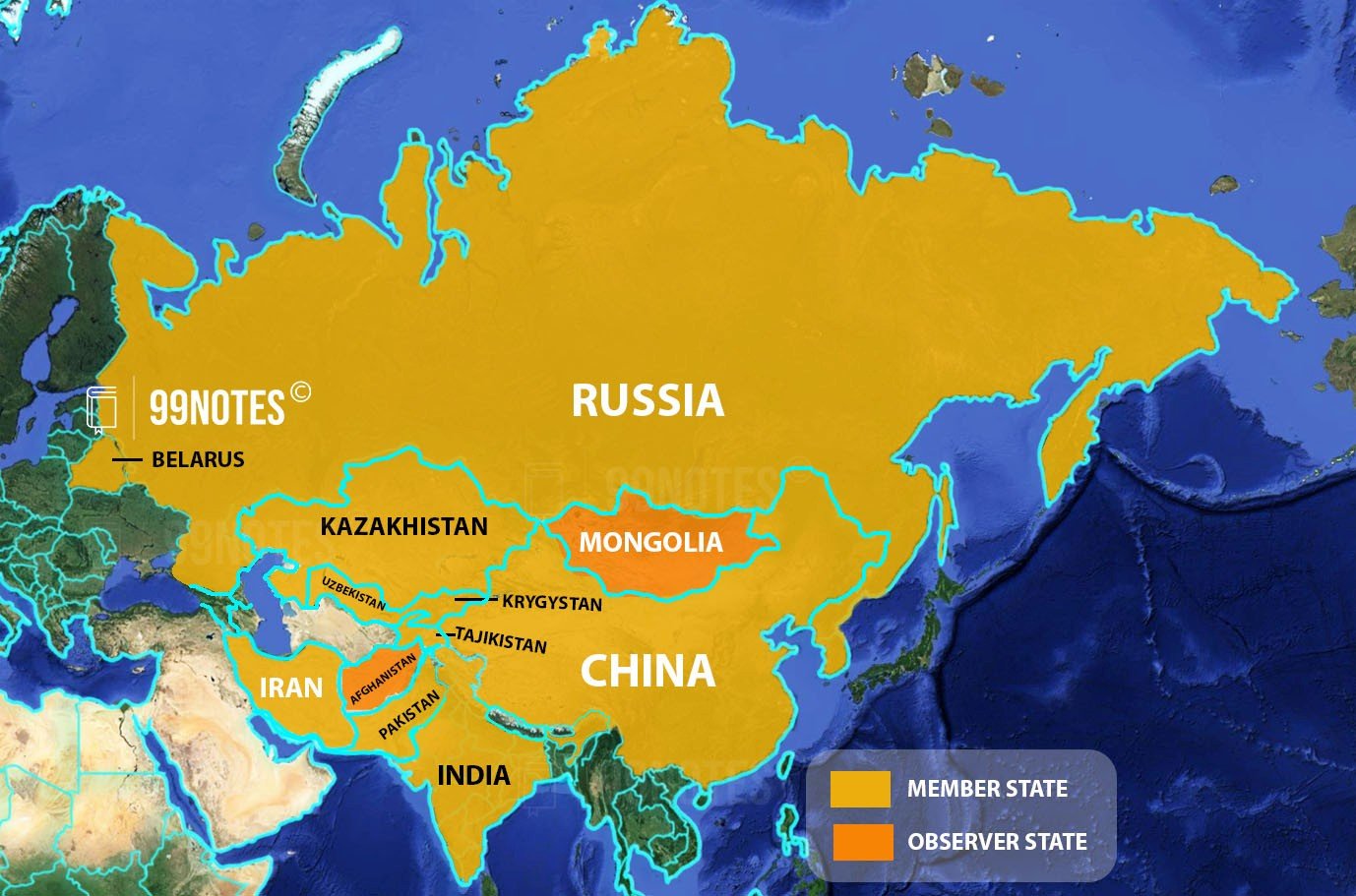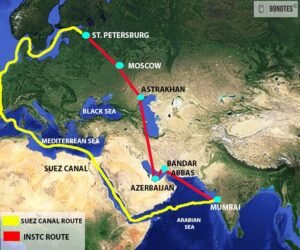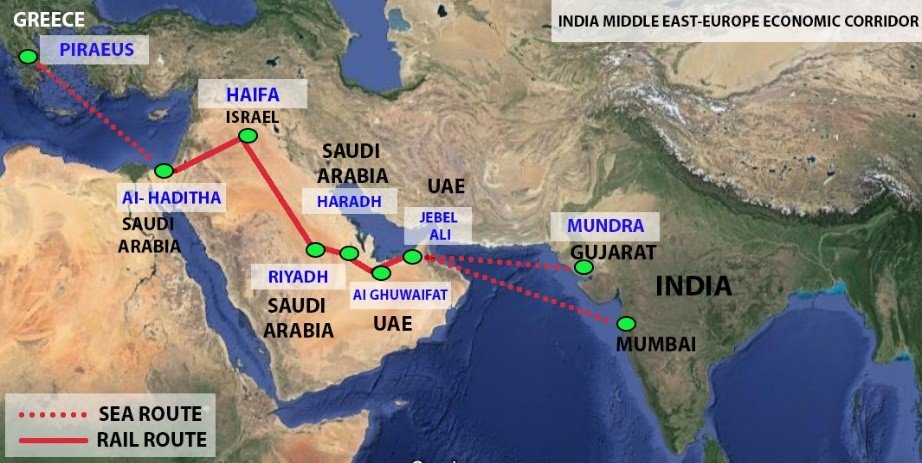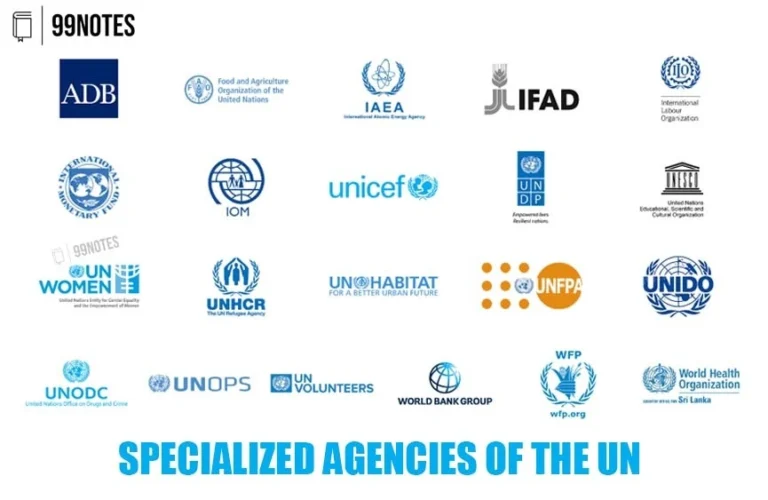Shanghai Cooperation Organisation (SCO)
Shanghai Cooperation Organization (SCO) is an international, intergovernmental political, security, and economic organization that was formed in Shanghai on June 15, 2001.
It encompasses ten countries: Russia, China, Kazakhstan, Kyrgyzstan, Tajikistan, Uzbekistan, India, Pakistan, Iran (added in 2023) and Belarus (added in 2024). It includes two countries with observer status (Afghanistan and Mongolia) and six dialogue partners, including Azerbaijan, Armenia, Cambodia, Nepal, Turkey and Sri Lanka.
While Turkmenistan is neither a member nor an observer state.
Evolution of SCO
In 1996, SCO was originally established as the “Shanghai Five” by China to address border security issues with Russia, China, Kazakhstan, Kyrgyzstan and Tajikistan. It was established with the signing of the Treaty on Deepening Military Trust in the border region to demilitarize borders in 1996.
Formation of SCO
In 2001, Uzbekistan was added to the origination and officially renamed as “Shanghai Cooperation origination”.
- In 2002, the SCO adopted its charter (a legal framework for the development of the Organization) at the St. Petersburg summit of the Heads of the state of SCO.
- In 2004, two permanent bodies were established in the SCO that is Secretariat in Beijing and the Regional Anti-terrorist Structure (RATS) Executive Committee in Tashkent.
India’s membership in SCO
Gradually, several countries were added to the group and it expanded. India too was added first as the observer state and then as a full member.
- Observer status to India, Iran and Pakistan in 2005, Mongolia (2004), Afghanistan (2012), and Belarus (2015).
- In 2017, India and Pakistan were granted the status of full members at heads of the state council of SCO in Astana (renamed as Nursultan)
- In 2018, PM Modi led the delegation to the first summit of Heads of State after becoming a full member in Qingdao, China.
- In 2020, the 19th meeting of the SCO Council of Heads of Government was hosted by India in a virtual format.
- In 2023, India hosted and assumed chairmanship of the 23rd summit of the Council of Heads of State for the first time.
- Varanasi has been nominated as the first-ever SCO Tourism and Cultural Capital for the year 2022-23.
- Belarus became the 10th member of the SCO in July 2024 and it became the 1st European country to join SCO.
Organisational structure:
- Heads of the State Council: It is the highest decision-making body in the organization and it meets once a year.
- Heads of the Government Council: It is the second highest body, which meets annually to discuss a strategy for multilateral cooperation. It solves important cooperation matters in economic and other areas and adopts the organization’s annual budget.
Permanent bodies of SCO
SCO has two permanent bodies, i.e. the secretariat of the SCO (primary executive Body) in Beijing, China and the Regional Anti-Terrorist Structure (RATS) in Tashkent.
| Secretariat of SCO and RATS |
Secretariat of SCO
Regional Anti-Terrorist Structure (RATS)
The SCO Secretary-General and the Executive Director of SCO RATS are appointed for a term of 3 years. |
The Chairmanship of SCO is by rotation for a year by Member States. The official working languages of SCO are Chinese and Russian.
Significance of SCO:
The importance of SCO can be seen by the fact that it represents:
- Economic Might: 42% of the world population and about 1/3rd of the global GDP.
- Resources: Its member states account for 25% of the world’s oil reserves and 50% of natural gas and uranium deposits.
Economic opportunities:
- Market access: SCO provides a platform for India to enhance its economic cooperation with Central Asian countries in sectors such as Information technology, Pharmaceuticals, and tourism. For instance, India can help the Central Asian states in their initiative, such as the Central Asia Regional Economic Cooperation (CAREC) Digital Strategy 2030, to scale and enhance digital literacy in the region.
- Tapping Natural Reserves: India can play a proactive role in tapping abundant reserves of valuable resources such as oil, natural gas, and minerals, including Uranium, from the Central Asian Region.
Infrastructure and connectivity:
India has begun working on an ambitious initiative to develop robust infrastructure and foster seamless trade networks to help bridge the gap between the Central Asian Region and the global market.
- International North-South Transport Corridor (INSTC) connects India to Central Asia, Russia and parts of Europe.
- India-Middle East-Europe Economic Corridor (IMEC) aims to enhance connectivity from India, the UAE, Saudi Arabia, Jordan, Israel and Europe and provide a formidable counter to China’s Belt and Road Initiatives (BRI).
- As a signatory to the Ashgabat agreement, India has been instrumental in facilitating the creation of a multimodal transport and transit corridor that connects Oman and the Persian Gulf with Central Asia.
- Strategic Investment: India has made a strategic investment in developing the Chabahar port along with the Persian Gulf in Iran. India wants the Chabahar port to be included in the INSTC as it is essential for India’s access to Afghanistan and central Asia.
- Credit Line: India has been pushing its ‘Connect Central Asia Policy’ and has extended a $1 billion credit line to the region to enhance trade, investment and capacity-building partnerships.
| Ashgabad Agreement |
The Ashgabat Agreement is a transport and transit corridor that connects Central Asia to the Persian Gulf. The agreement was signed in 2011 by Iran, Oman, Qatar, Turkmenistan, and Uzbekistan. India joined the agreement in 2018.
Member countries
Importance of Ashgabad Agreement Connectivity Projects – India aims to leverage the Ashgabad Agreement to accelerate the development of the International North-South Transport corridor, with a link with Afghanistan. It can help India in the following ways:
|
Strategic importance
- Reach in Central Asia: SCO plays an important role in the Central Asia policy of India as it enables India to play India an important role in the regional politics of Central Asia.
- Platform to communicate with Pakistan: In recent years, India has refused to engage with Pakistan due to its use of Terrorism as a political tool. In this context, SCO often acts as a platform where India and Pakistan can engage. Such talks are often even mediated by Russia.
- It also gives opportunities to India, China and Pakistan to cooperate on a wide range of areas with mutual consensus despite bilateral issues.
Foreign Policy:
- The Central Asian Region (CAR) holds an important position in India’s geostrategic outreach and is part of the country’s ‘extended neighbourhood’.
- SCO is a part of India’s stated policy of pursuing “Multi-alignment” and “strategic autonomy.”
| India’s Extended Neighbourhood |
| India’s Extended Neighbourhood is defined in geographical terms to include countries in the Indian Ocean Region, East Africa, Gulf Region, Central Asian Region and in south-east Asia.
The “Extended neighbourhood policy” is a foreign policy that involves strengthening ties with countries that are further away from India but still have strategic, cultural, economic, and political interactions with it to enhance regional cooperation and address mutual concerns. Multilateral organisations like the ASEAN, BIMSTEC, QUAD and SCO are important elements of this policy. |
Energy security:
- As the CAR supplies around 10% of oil and energy to the world, it can fulfil India’s energy needs through regional diplomacy.
- India’s pending energy projects like the TAPI (Turkmenistan-Afghanistan-Pakistan-India) pipeline, IPI (Iran-Pakistan-India) pipeline, and CASA (Central Asia-South Asia) providing 1000 electricity transmission projects, all of which are blocked, due in part to Pakistan’s recalcitrant approach can get a much-needed push through the SCO.
Regional Security:
- SCO’s Regional Anti-Terrorist structure will help India in curbing Regional terrorism, as Pakistan and Afghanistan are also part of the organization.
- One of the important functions of SCO RATS is coordination and information sharing, which will aid in making informed decisions.
People-to-people ties:
- India emphasized the importance of building people-to-people connections, which aligns with India’s vision of Vasudhaiva Kutumbakam (the world is one family).
- Kashi (Varanasi) was designated as the 1st SCO Tourist and Cultural Capital of 2022-23, enhancing India’s role as a cultural ambassador within the SCO.
- Indian students studying medicine in Central Asian countries and Medical tourism to India has bolstered soft power. For instance, Uzbekistan provides 2,000 medical seats for Indian students in its medical universities.
- India organized numerous signature events to deepen connection, including SCO Film Festivals and SCO Millet Food Festival. SCO Tourism Mart, Conference on Shared Buddhist Heritage, B2B Conference on Traditional Medicine, etc.
- India provided a platform for young individuals from SCO Member States to engage in research and innovation activities. For instance, the Young Scientist Conclave, the Startup Forum, the SCO Youth Council and Conference, and the SCO Resident Researchers Programme.
Concerns:
- Lack of connectivity: One of India’s significant constraints is the lack of adequate connectivity with the landlocked CARs, especially due to Chinese dominance through the Belt and Road Initiative.
- Definition of Terrorism: SCO’s definition of terrorism is different from that of India. India stands by state-sponsored border terrorism, but as per SCO’s definition, terrorism coincides with regime destabilization.
- Presence of Pakistan and China: the presence of China and Pakistan in the SCO limits India’s ability to push on the matter of terrorism, as Pakistan itself has indulged in a proxy war with India. China has repeatedly protected terrorists from Pakistan in the United Nations Security Council (UNSC) with its veto power.
- Distrust among members: The increasing closeness of China and Russia adds to the difficulty that India faces due to the China-Pakistan axis in the SCO.
Way forward:
- Cooperation with SCO’s RATS: India with SCO’s RATS aid, helps to counter terrorism by working towards intelligence sharing, extradition arrangements, etc.
- Through the SCO, India can also work on anti-drug trafficking, which is a significant concern for Afghanistan.
- Expanding connectivity: A high priority focus should be given to broadening connectivity between India and the region, especially given the centrality of Central Asian states. For instance, the International North-South Transport Corridor (INSTC) and the India-Middle East-Europe Economic Corridor (IMEC).
- Independent Voice against China’s Dominance: India has articulated its view on the Belt and Road Initiative that the connectivity projects must respect Sovereignty and territorial integrity.
- It is said that the SCO has traditionally adopted an anti-Western posture. Therefore, India must identify itself distinctly and avoid such rhetoric, which the SCO promotes.
- The focus should be on including the English language as one of the primary languages apart from Russian and Mandarin in SCO RATS to maintain the terrorism and terror-related database, which will enhance communication on counterterrorism in the larger Eurasian Language.








